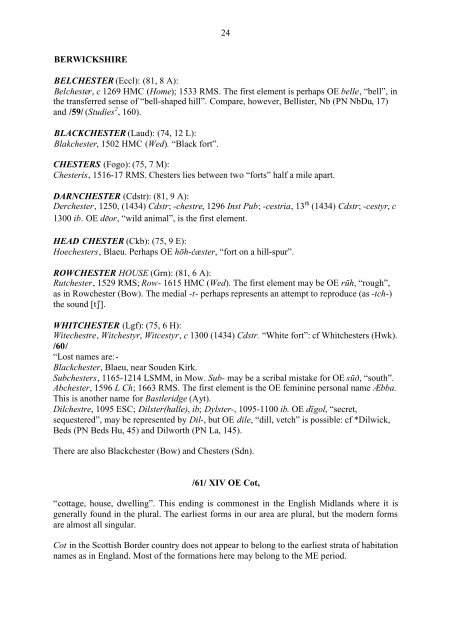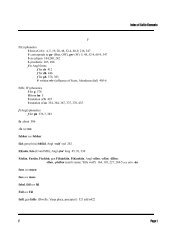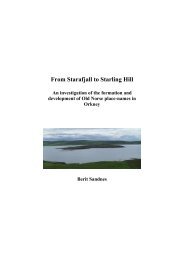May Williamson: The Non-Celtic Place-Names of the Scottish Border ...
May Williamson: The Non-Celtic Place-Names of the Scottish Border ...
May Williamson: The Non-Celtic Place-Names of the Scottish Border ...
You also want an ePaper? Increase the reach of your titles
YUMPU automatically turns print PDFs into web optimized ePapers that Google loves.
24<br />
BERWICKSHIRE<br />
BELCHESTER (Eccl): (81, 8 A):<br />
Belchester, c 1269 HMC (Home); 1533 RMS. <strong>The</strong> first element is perhaps OE belle, “bell”, in<br />
<strong>the</strong> transferred sense <strong>of</strong> “bell-shaped hill”. Compare, however, Bellister, Nb (PN NbDu, 17)<br />
and /59/ (Studies 2 , 160).<br />
BLACKCHESTER (Laud): (74, 12 L):<br />
Blakchester, 1502 HMC (Wed). “Black fort”.<br />
CHESTERS (Fogo): (75, 7 M):<br />
Chesteris, 1516-17 RMS. Chesters lies between two “forts” half a mile apart.<br />
DARNCHESTER (Cdstr): (81, 9 A):<br />
Derchester, 1250, (1434) Cdstr; -chestre, 1296 Inst Pub; -cestria, 13 th (1434) Cdstr; -cestyr, c<br />
1300 ib. OE dor, “wild animal”, is <strong>the</strong> first element.<br />
HEAD CHESTER (Ckb): (75, 9 E):<br />
Hoechesters, Blaeu. Perhaps OE hōh-ċæster, “fort on a hill-spur”.<br />
ROWCHESTER HOUSE (Grn): (81, 6 A):<br />
Rutchester, 1529 RMS; Row- 1615 HMC (Wed). <strong>The</strong> first element may be OE rūh, “rough”,<br />
as in Rowchester (Bow). <strong>The</strong> medial -t- perhaps represents an attempt to reproduce (as -tch-)<br />
<strong>the</strong> sound [tS].<br />
WHITCHESTER (Lgf): (75, 6 H):<br />
Witechestre, Witchestyr, Witcestyr, c 1300 (1434) Cdstr. “White fort”: cf Whitchesters (Hwk).<br />
/60/<br />
“Lost names are:-<br />
Blackchester, Blaeu, near Souden Kirk.<br />
Subchesters, 1165-1214 LSMM, in Mow. Sub- may be a scribal mistake for OE sūð, “south”.<br />
Abchester, 1596 L Ch; 1663 RMS. <strong>The</strong> first element is <strong>the</strong> OE feminine personal name Æbba.<br />
This is ano<strong>the</strong>r name for Bastleridge (Ayt).<br />
Dilchestre, 1095 ESC; Dilster(halle), ib; Dylster-, 1095-1100 ib. OE dīgol, “secret,<br />
sequestered”, may be represented by Dil-, but OE dile, “dill, vetch” is possible: cf *Dilwick,<br />
Beds (PN Beds Hu, 45) and Dilworth (PN La, 145).<br />
<strong>The</strong>re are also Blackchester (Bow) and Chesters (Sdn).<br />
/61/ XIV OE Cot,<br />
“cottage, house, dwelling”. This ending is commonest in <strong>the</strong> English Midlands where it is<br />
generally found in <strong>the</strong> plural. <strong>The</strong> earliest forms in our area are plural, but <strong>the</strong> modern forms<br />
are almost all singular.<br />
Cot in <strong>the</strong> <strong>Scottish</strong> <strong>Border</strong> country does not appear to belong to <strong>the</strong> earliest strata <strong>of</strong> habitation<br />
names as in England. Most <strong>of</strong> <strong>the</strong> formations here may belong to <strong>the</strong> ME period.




